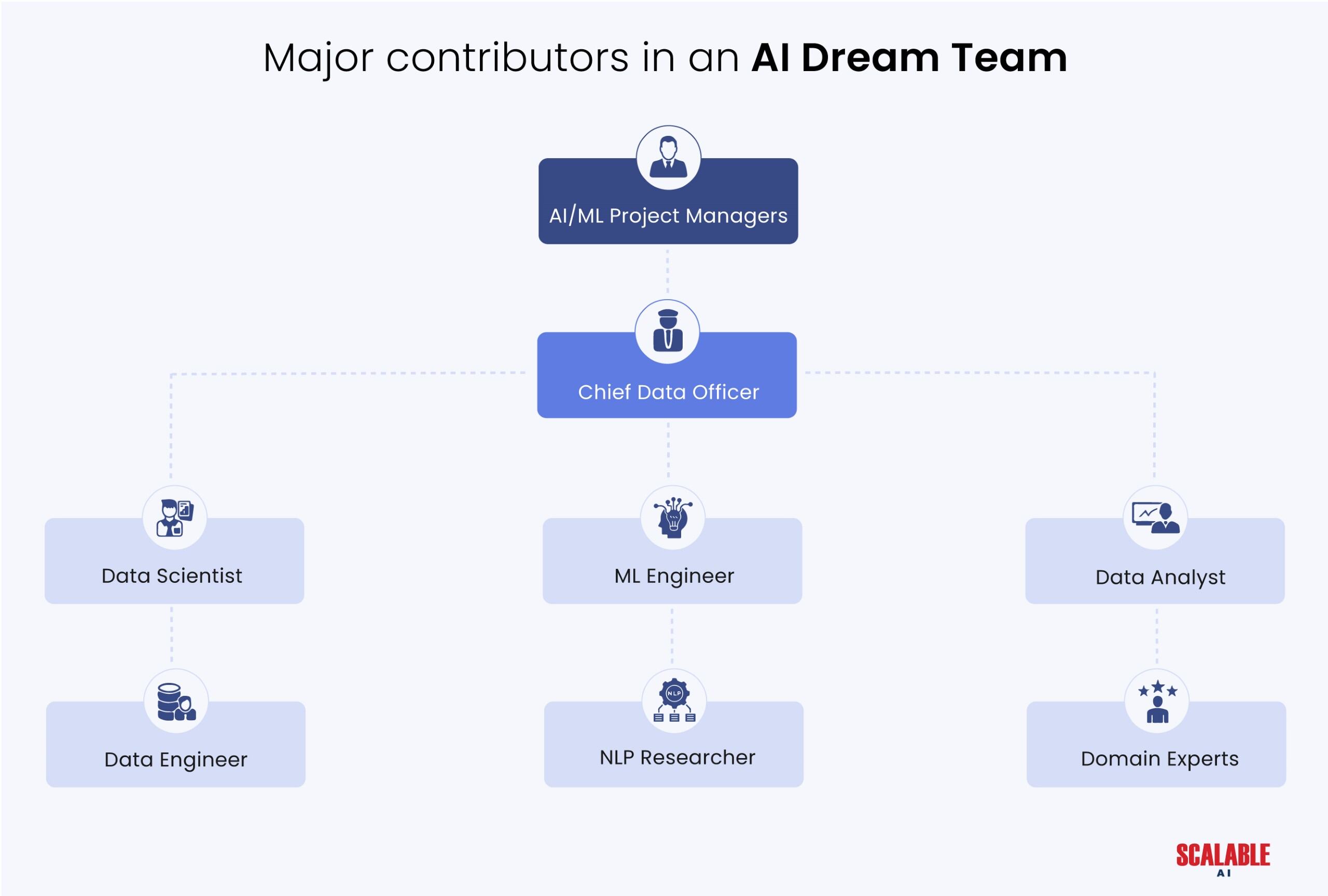Executive Summary :
Artificial Intelligence (AI) integration is becoming more and more necessary in today’s quickly changing digital business world. Using AI to its maximum use can change businesses for the better and increase their competitiveness. Establishing a skilled AI team is essential for firms to successfully embark on this journey. A group of people working on machine learning algorithms is not the only thing that makes up an AI team. It is a multidisciplinary team that brings together a range of specialties to accomplish a shared objective: integrating AI-driven insights into the core of a digital company. Here are the important roles that are the pillars of a well-defined AI team.
AI/ML Project Managers:
These managers are skilled in overseeing artificial intelligence initiatives, ensuring that the allocation of resources, timelines, and goals align with the project’s aims. The project manager is also in charge of overall project progress. To make sure that AI initiatives are completed on time and with the desired results, they supervise their planning, implementation, and oversight. Their broad responsibilities include:
- Setting project objectives and scopes.
- Controlling finances and resources.
- Reducing risks and resolving difficulties.
- Encouraging cooperation and communication among team members.
Chief Data Officer:
This senior executive role is in charge of the organization’s overall data usage and governance. The CDO is in charge of governance throughout the entire organization and the use of information as an asset through various channels, including data processing, analysis, mining, and trading. The CDO oversees data mining and processing for the entire company and is a member of the executive management group.
Data Engineer:
AI is made possible by data engineers who build strong data infrastructure. To make data available for analysis and modeling, they construct pipelines for extracting, transforming, and loading (ETL) data. A data engineer is a specialist who designs, builds, and oversees the infrastructure and architecture required for efficiently managing and preserving large data sets. The Major Responsibilities of a data engineer include:
- Creating and managing databases and data warehouses.
- Constructing data pipelines to ensure smooth data transfer.
- Guaranteeing the security, consistency, and quality of data.
- Working together with data scientists to promote AI projects.
Data Analyst:
Through the extraction of valuable insights from vast volumes of data, data analysts play a pivotal role in helping businesses in their endeavors to expand and make informed decisions. Proficiency in data management and visualization techniques, together with statistical and analytical skills, are essential in this sector. Collection, processing, and analysis of data statistically are done by data analysts. They offer translations of sales data, market research, logistics, and transportation costs into plain English. They manage, calibrate, and standardize the data to make its extraction and use easier.

Data Scientist:
AI models are designed by data scientists. Their profound comprehension of mathematical and statistical principles allows them to create models that are both prescriptive and predictive. The broad responsibilities include:
- Gathering, organizing, and preparing data.
- Creating and honing models for machine learning.
- Assessing the model’s performance and making iterative improvements.
- Working together with subject matter experts to improve AI solutions.
NLP Researcher:
NLP researchers are adept at developing and refining NLP systems that can comprehend and interpret human language by utilizing methods like machine learning and data analysis. The focus area for an NLP scientist is modeling approaches for written text data.
ML Engineer:
For software to be scalable and production-ready, ML developers work closely with data scientists to translate AI or ML models. They can translate a Data Scientist’s model from the Jupyter notebook into the real world, where the business can use it, and they are skilled in MLOps. Without them, your excellent model developed by a data scientist is probably going to produce little value since your clients can’t engage with it or it can’t be programmed to operate on autopilot and make predictions.
Domain Experts:
Experts in a certain field have in-depth knowledge of the business and are aware of the unique opportunities and problems it faces. Their job is to work closely with engineers and data scientists to create AI goals and efficiently interpret outcomes.
An ideal AI team is composed of strategic contributors
The efficacy of AI teams is critical to the success of AI implementations in digital business environments. Every position on the team brings a specialization to the table, which promotes cooperation and unity. Digital business firms can put themselves on the route to success with AI by understanding the roles and duties mentioned above.
Read Whitepaper AI Talent Acquisition: Your Hiring Blueprint
